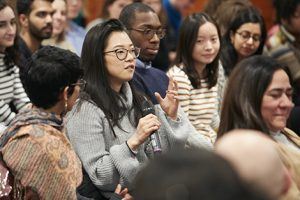March 6, 2019 – Using artistic tools like music, storytelling, photos, and multimedia could be a powerful way to promote healing as well as social justice.
That was the message at a recent Harvard T.H. Chan School of Public Health event that featured Esperanza Spalding, a Grammy-winning jazz bassist, vocalist, and composer and a professor of practice in Harvard University’s music department. Spalding and student panelists talked about art, healing, and social justice—and Spalding sang and played bass on a few of her witty social-commentary-filled compositions—before a rapt audience of about 200 in Kresge cafeteria on February 27, 2019.
Dean Michelle Williams introduced Spalding as someone who “connects with communities about all the things we care about [regarding] improving population health.”
Rafael Irizarry, professor of biostatistics and a musician himself, moderated the event, which featured four student panelists: Melanie Chitwood, an SM student in global health and population; Tariana Little, a DrPH candidate; Ayesha McAdams-Mahmoud, doctoral student in social and behavioral sciences; and Katy Weinberg, an MPH student. The students asked Spalding questions about the intersection of art and health and also discussed their own work.
Little, for example, talked about creating social impact storytelling through EmVision Productions, a production agency she co-founded. One EmVision venture is an English/Spanish bilingual multimedia project to tell real stories of people who have been affected by the opioid epidemic, both to educate other people and to amplify the work of the Massachusetts Substance Use Helpline.
Weinberg discussed her efforts in Zambia to address youth HIV risk with pop songs. She worked with a Zambian gospel storyteller named Ephraim to create a song with youth-tailored information about HIV. After the song played on the radio, 100% of a group of young people surveyed about the song reported that they fully understood the HIV information in its lyrics. In the future, Weinberg plans to work with other Zambian artists on weaving HIV information into their songs and storytelling.

For her part, Spalding said she would like to learn how music therapy might ease neurological symptoms of early childhood trauma. Maybe, she suggested, elements in music therapy that are known to help children could be condensed into a sort of vaccine—in the form of a song or a series of songs. “Something like this would be repeatable, and it’s non-invasive,” she said.
Spalding added that art can provide a “cloak of anonymity” that makes it easier for people to share stories that are intimate or painful or hopeful. “There is something about calling something art, about having that one degree of separation, that makes it feel so much safer to share truths, and to receive other people’s truths,” she said.
photos: Kent Dayton
